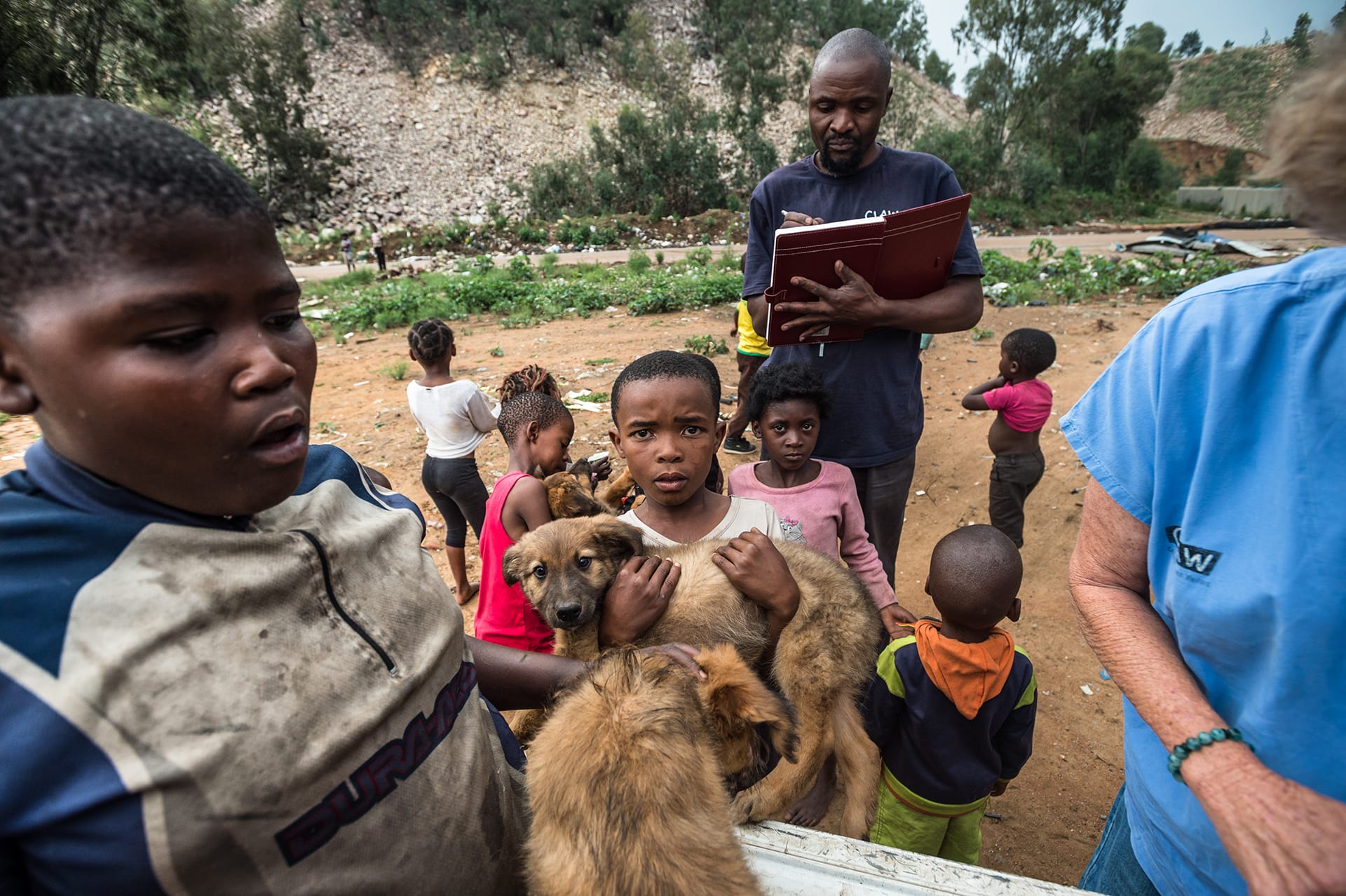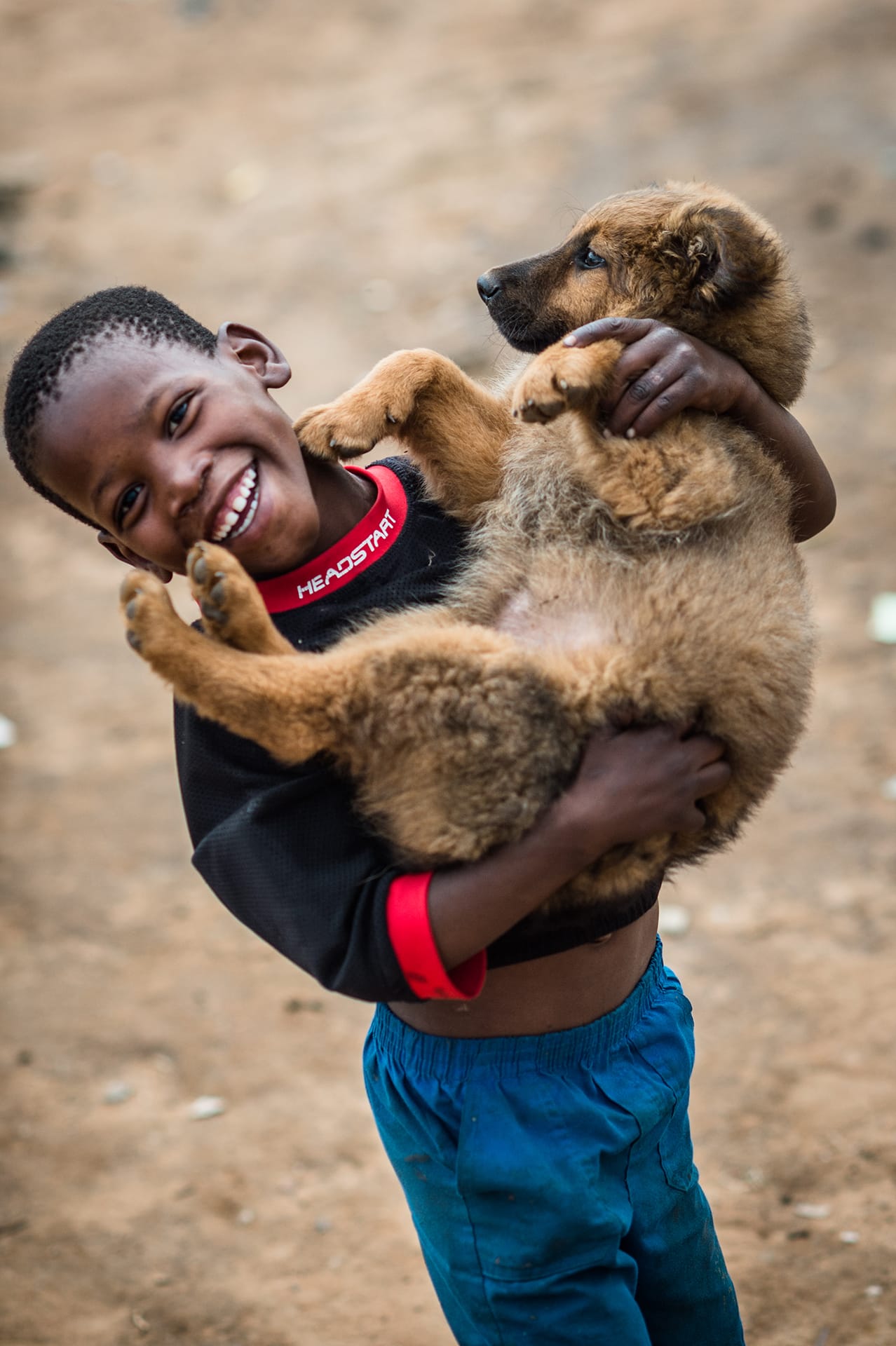Cora Bailey
Founder of the organization Community Led Animal Welfare
Photos and interview by Jo-Anne McArthur.
Story by Corinne Benedict.
“This is not a nice place,” Bailey, a petite blonde in her mid-60s, says of the neighborhood, a desperate, deeply impoverished part of Soweto, a township on the outskirts of Johannesburg. It’s so dangerous here that few white South Africans dare to come.
But Bailey is different. She visits the townships daily. She knows this little boy well. She worries he’s already going crooked, spending time with the wrong people in the absence of parents.
Photo: Cora with a rescued piglet at the Randfontein municipal dump site.
Where does she go? Why are we always hungry?
“Tell me,” she says, and the boy, starting to cry, unloads. His mother is never around, he says. She doesn’t look after any of his siblings, so he is left to change nappies and beg neighbors for food. Where does she go? Why are we always hungry? He asks Bailey.
“Most of that war was in the townships,” says Bailey, a mother of four and grandmother of seven. After massacres, she’d visit their scenes to collect the animals who had been left behind, injured and starving.
Quickly, Bailey learned a truth that has defined her life’s work:
If you want to help animals here, you have to help humans, too.
Photo: A monkey saying hello to Cora Bailey.
“We didn’t ever set out to do food parcels or community gardens or to counsel sick people. But it’s hard not to do that when they have nothing.”
Bailey’s days are as varied as they are trauma-filled. Essentially, she spends them doing the best she can to alleviate suffering wherever she finds it, and in a place like this, it’s easy to find.
Especially when you can’t seem to stop yourself from looking for it.
Especially when you’re the only one there is to call.
Photo: Bailey and community members of the Randfontein municipal dump site.
Photo: Bailey chatting with friends and dogs in Soweto.
While visiting a child with cerebral palsy, she might get a call about a vervet monkey or chacma baboon who has been chased up a tree after wandering into a suburb.
Imagine how scary this must be for the monkey, she’ll say. He must want to be with his family again.
Whenever her phone rings – suicidal children, dogs with all four legs broken, alcoholic rampages – Bailey’s answer is usually the same, even late at night:
I’m coming.
Hard: Driving through Soweto, she spots a group of young men. They make money fighting dogs and selling drugs, and after Bailey made problems for them, they threatened to burn her house down, which, here, is well within the realm of plausibility. But Bailey doesn’t turn her car around or hurry by. She slows down, pulls up next to them, rolls down her window, leans out and stares.
Soft: Inside a rundown hut, Bailey cradles a woman named Petronela who has AIDS and is gravely sick. Petronela cries about her philandering husband, the pain of dying, and her worry for her children. Bailey listens, and then helps get her into hospice care.
Photo: Cora Bailey with a semi-paralyzed puppy.
Bailey has been shot at and held up.
When a girl is raped, Bailey is often summoned instead of the authorities. Women with nowhere else to go have shown up at her veterinary clinic to give birth. She has been asked to adopt people’s children, which she has. She has taken on too many fosters over the years to count, both animal and human.
Bailey finds Moses, who spent years coming and going from her house when he was younger. They chat as they walk The Dumping together. They find a runt piglet struggling desperately to keep up with her litter. Bailey scoops her up. Filthy and tiny, it’s clear she’s severely malnourished –– without the right nutrition soon, she may not survive. Next, they find a bone-thin dog so sick and pained that Moses has to carry him to Bailey’s car. With the piglet asleep in the front and the dog vomiting in the back, Bailey drives to CLAW’s clinic.
Photo: Moses helping round up dogs for vaccinations and vet checks at the CLAW mobile vet clinic at the Randfontein municipal dump.
Bailey stays up all night with the piglet, who survives, is named Whammy and ends up at a sanctuary. The dog recovers too.
“There are thousands of places we can’t reach,” she says. “The hardest part is when you stop and think about how much there is to do.”
Photo: Cora Bailey and Anna, a friend and community worker, in some of the community gardens in Soweto. CLAW staff and volunteer teach community gardening to Soweto inhabitants.
She says the problem is the overwhelming divide between haves and have-nots in South Africa. The haves must do more, she says.
“We’ve got to get out of this bubble.”
They also take inspiration from her. Bailey has influenced activists all over South Africa and beyond.
They also take inspiration from her. Bailey has influenced activists all over South Africa and beyond.
“Cora infuses everyone she meets with her passion to make the world a better place for all,” says Kathy Raffray, from the organization Ban Animal Trading.
“She’s a radiant beacon of hope in a very lost world.”
Photo: A sick piglet living at the Randfontein municipal dump in Soweto.

“I can’t lie. Anxiety. Insomnia. I’m not always very together. It’s hard to switch off and find peace.”
Why does she do it?
“It was an accident,” she says.
“I saw it, and once I did, I couldn’t turn away.”
Photos and interview by Jo-Anne McArthur. Story by Corinne Benedict.




























